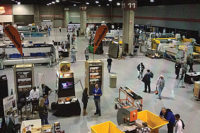Equipment at work on the show floor included bridge sawing technology as well as multiple edge polishers, multiple surface polishers and equipment for processing scrap material into pavers and split-face wall treatments. This machinery was being used to process stone in slab and other formats, giving attendees the opportunity to see it operate under the same conditions as in a fabrication shop. In some cases, a machinery supplier partnered with a supplier of tooling and accessories to demonstrate the abilities of the combined technology.
Also of note, suppliers of tooling and accessories were once again able to showcase their products in action within “The Cage,” a dedicated area where attendees could use and test products from the sponsors in attendance.
“The Cage” was also the site for an innovative competition among attendees. The “Fabricator Olympics” tested the skills of stoneworking professionals in three different categories: edge profiling, flat edge polishing and top polishing. A large turnout of competitors entered the program, and it was one of the highlights on the show floor during the event’s first two days.
The SFA MegaWorkshop also featured a range of classroom seminars, and they included: Importing, Digital Integration, Glues, Social Media, Enhancing the Buying Experience, Digital Information Flow, Texturing, Sealers, Merchandising, Industry Trends, Green Options, Developing a Business Plan (see “Session Spotlight”) and a number of specialized roundtable discussions.
Future SFA workshops will be taking place at member fabrication shops on an ongoing basis, with sessions planned across North America.
|
Seminar Spotlight: Forming a Business Plan
As part of the classroom sessions at the SFA MegaWorkshop, Ron Hannah of Cadenza Granite & Marble, Inc. of Concord, NC, offered some candid insight on forming a business plan and managing employees. One of the major points Hannah emphasized was the need to understand every single cost and how this affects the bottom line. “You can’t manage what you can’t measure,” he said. “You need to analyze the viability of every decision, and think of what positives will come from it. If your company is not making money, then it is simply a hobby.” To help evaluate business decisions and investments, Hannah suggested using spreadsheets to help analyze relevant data. “Mircosoft Excel is the best thing that happened to me,” he said. “When I bought my slab polisher, I first visited a shop using the machine. When I returned, I ended up in a long delay at the airport, and I spent 16 hours analyzing the ‘what-ifs.’ I said that if I can do X amount of work per week, I will get Y amount of revenue, and I ended up making the investment.” In conducting these analyses, however, Hannah said it is critical to be as accurate as possible. “Don’t exaggerate how much you can make, and be honest with yourself,” he said. “You might find that you should go find another line of work, but you might also find that you can adjust one or two things and make some money.” Using a detailed sample worksheet as an example, Hannah outlined all of the costs that need to be considered in a monthly business plan, including: • Advertising • Building • Equipment • Insurance • Office Supplies • Payroll (broken out by individual + payroll burdens) • Taxes • Shop Supplies • Telephone • Utilities • Vehicle Expenses On the other side of the ledger, a company must also examine its revenue. This is essentially the number of jobs per day x the average amount of square feet per job x the selling price. This also must account for the cost of the material. “You want to look at your revenue per job and also your stone cost per job,” Hannah said. “When you compare your expenses, revenue and stone cost, you can calculate how much it costs per square foot to fabricate.” Hannah also demonstrated how a fabricator can use spreadsheets to calculate a projected net profit, and how that figure would change when line items such as the stone costs or the amount of jobs processed are adjusted. In a specific example of adjustments to a company’s ledger, he showed how investing in a new machine would impact monthly expenses, while also examining how that investment would/could increase production and — ultimately — would affect a company’s net profits. “Take the time to do the analysis,” he said. Employee relations In managing a business, Hannah stressed the need to set parameters with employees. “Did you ever notice how whether you have one job for the day or five jobs, your employees always look just as busy?” he asked. “You have to set parameters that you can measure. Say, ‘This kitchen must be done by noon, and this one must be done by 4 p.m.” These parameters should also include making sure the shop is up and running at the scheduled start of the workday. “We don’t let our workers take an hour to mobilize,” Hannah said. “We start our day at 7:30 a.m., and this means I want machines running at 7:30 a.m.” It is also key to make sure that the machinery is quickly loaded and unloaded when it stops running. “My CNC isn’t making money for me if it isn’t running,” he said. “At the end of the day, I want that machine loaded. Then the last thing they can do for the day is hit ‘Cycle Start,’ and that machine will be running. And when that machine stops during the day, I want my workers around it like a NASCAR pit crew getting the next piece on there.” While it is essential to set parameters for employees, Hannah also said that it is important to make them feel a part of the success of the business. “Share your praise with them, and let them know about your business plan,” he said. “Make them feel responsible.” Hannah pointed out that while the recession has forced many fabrication shops to reduce staff — thus requiring more hands-on work by many owners — it is still crucial to always consider the overall direction of a fabrication business. “We are all back in the trenches these days, but as an owner, you still have to step back, put your owner hat on and think about how to make your business better,” he said.
|
|
The SFA MegaWorkshop included a range of practical classroom seminars. Among them, Ron Hannah of Cadenza Granite & Marble, Inc. of Concord, NC, offered some candid insight on forming a business plan and managing employees. |











